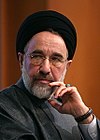Ghorbanali Dorri-Najafabadi
Ghorbanali Dorri-Najafabadi | |
|---|---|
 Dorri-Najafabadi in 2016 | |
| Attorney-General of Iran | |
| In office 23 August 2004 – 24 August 2009 | |
| Appointed by | Mahmoud Hashemi Shahroudi |
| Preceded by | Abdolnabi Namazi |
| Succeeded by | Gholam-Hossein Mohseni-Eje'i |
| Minister of Intelligence | |
| In office 20 August 1997 – 9 February 1999 | |
| President | Mohammad Khatami |
| Preceded by | Ali Fallahian |
| Succeeded by | Ali Younesi |
| Member of Expediency Discernment Council | |
| Assumed office 17 March 1997 | |
| Appointed by | Ali Khamenei |
| Chairman | Akbar Hashemi Rafsanjani Ali Movahedi-Kermani (Acting) Mahmoud Hashemi Shahroudi Sadeq Larijani |
| Member of the Assembly of Experts | |
| Assumed office 23 February 1999 | |
| Constituency | Tehran province |
| Majority | 2,056,427 |
| In office 21 February 1991 – 22 February 1999 | |
| Constituency | Ilam province |
| Member of the Parliament of Iran | |
| In office 28 May 1992 – 18 August 1997 | |
| Constituency | Tehran, Rey, Shemiranat and Eslamshahr[1][2] |
| In office 28 May 1980 – 28 May 1984 | |
| Constituency | Ardal[3] |
| Personal details | |
| Born | Hosseinali Dorri 3 December 1950 Najafabad, Isfahan province, Iran |
| Alma mater | Qom Seminary |
| Website | www.dorri.ir |
Ghorbanali Dorri-Najafabadi (Persian: قربانعلی دری نجفآبادی; born 3 December 1950) is an Iranian politician and cleric. He is currently a member of the Assembly of Experts and also a member of the Expediency Discernment Council. He was previously the Minister of Intelligence of Islamic Republic of Iran.
Career
[edit]Dorri-Najafabadi was the minister of intelligence in the cabinet of then president Mohammad Khatami.[4] During his term of ministership, some journalists and reformist politicians were murdered by security agents, for which the Iranian government later charged his deputy, Saeed Emami, with orchestrating, claiming he had organized them independently. Dorri-Najafabadi resigned and was succeeded by Ali Younessi. The events were later named the "Chained Murders" by the reformist cabinet of President Mohammad Khatami.
After Mohammad Ismaeil Shooshtari, in 2005, he was the attorney-general of the Islamic Republic of Iran.[5][6] He was succeeded by Jamal Karimi-Rad in the post.
In 2008, he said that toys such as the Barbie doll are "destructive culturally and social danger."[7]
Compulsory hijab
[edit]Dorri-Najafabadi is a fierce advocate of compulsory hijab in Iran. At a Friday prayer sermon, he said, "Holocaust has been as a pretext to fight hijab."[8]
See also
[edit]References
[edit]- ^ "Getting to Know the Representatives in the Majles" (PDF), Iranian Parliament, The Iran Social Science Data Portal, p. 403
- ^ "Getting to Know the Representatives in the Majles" (PDF), Iranian Parliament, The Iran Social Science Data Portal, p. 521, archived from the original (PDF) on 30 November 2016, retrieved 15 April 2016
- ^ "Getting to Know the Representatives in the Majles" (PDF), Iranian Parliament, The Iran Social Science Data Portal, p. 56
- ^ Gasiorowski, Mark J. (1 October 2000). "The power struggle in Iran". Middle East Policy. Retrieved 19 June 2013.
- ^ "Statement by Dorri Najabadi" (PDF). United Nations. 23 April 2005. Retrieved 19 June 2013.
- ^ ISNA – 2 December 2006 – 84/11/23 Archived 28 October 2006 at the Wayback Machine
- ^ "Iran calls for ban on Barbie doll". BBC News. 28 April 2008.
- ^ "Friday Sermon in Arak, Iran by Gholamali Dorri-Najafabadi: Six Million Jews Were Not Killed in the Holocaust – It Was More Like 50 or 60 Jews; the Holocaust Has Been a Pretext to Fight Against Islam and the Hijab for 70 Years".
External links
[edit]
Page Template:Asbox/styles.css has no content.
- 1950 births
- Living people
- People from Ray, Iran
- Iranian ayatollahs
- Iranian Holocaust deniers
- Members of the Expediency Discernment Council
- Members of the Assembly of Experts
- Representatives of the Supreme Leader in the Provinces of Iran
- Ministers of intelligence of Iran
- Central Council of the Islamic Republican Party members
- Society of Seminary Teachers of Qom members



